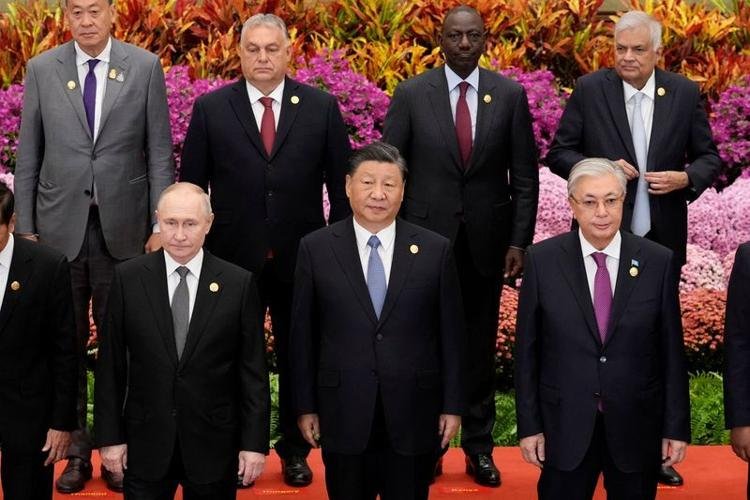In a stunning display of global solidarity, the Russian leader, Vladimir Putin, received an illustrious red carpet reception at a global summit held in Beijing. This historic gathering, under the auspices of China’s President Xi Jinping, marked a grandiose celebration of the decade-long journey of his iconic foreign and economic brainchild – the Belt and Road Initiative (BRI).
You Can Also Read: Decade of Belt and Road Initiative: China’s Global Connectivity and Trade Surge
Amidst the illustrious assembly of leaders and dignitaries hailing from over 130 nations, Mr. Putin assumed the distinguished role of the guest of honour. His presence, a rarity since the incursion into Ukraine in February of the previous year, showcased his increasing diplomatic isolation. It also highlighted the looming specter of an International Criminal Court (ICC) arrest warrant, linked to alleged war crimes committed during the Ukrainian crisis.
Spotlight on Putin and Xi’s ‘No Limits Friendship’
Nevertheless, the prospect of Mr. Putin’s arrest within the confines of China remains highly improbable, as Beijing, conspicuously, is not a signatory to the ICC’s statutes. His close ties with President Xi have been a subject of global discourse. This bond epitomizes a relationship characterized by President Xi’s resounding proclamation of a “no limits friendship” between their nations, a declaration made just before the conflict began.
The climactic unfolding occurred on October 18, 2023, during Wednesday’s proceedings, and it was nothing short of a grand spectacle. It commenced with a resplendent opening ceremony held within the prestigious Great Hall of the People in Beijing. As the ceremony commenced, it was President Xi and Mr. Putin who took the lead, striding shoulder to shoulder at the forefront of a gathering comprising leaders from various nations.
This striking visual continued as Mr. Putin was placed front and center alongside the Chinese President for the momentous group photograph, signifying the pivotal role he played in the event. Furthermore, Mr. Putin took on the role of the second speaker after President Xi. During their three-hour bilateral meeting, the two leaders delved into discussions on both Ukraine and the complex landscape of the Middle East.
Subsequently, in a moment charged with global significance, Mr. Putin alluded to the escalating number of conflicts plaguing the world, highlighting the shared challenges posed by external factors. In a resolute tone, he declared during a news conference, “All these external factors are pervasive threats that serve to fortify the collaborative spirit of Russian-Chinese cooperation.”

China and Russia Challenge Western Hegemony
In past Belt and Road summits, Mr. Putin held a prominent position, but those occasions transpired prior to Russia’s incursion into Ukraine. Subsequently, China faced censure from the West for its unwavering support of Russia, despite its attempts to display solidarity with Ukraine.
Front and center in the group photo were Mr. Putin and Mr. Xi. On Wednesday, Mr. Putin was eager to reciprocate this symbolic gesture. During his address, he wholeheartedly pledged his backing for Mr. Xi’s ambitious BRI project, affirming that it harmonized with Russian principles. He lavished praise upon “our Chinese friends” for their commendable achievements.
The Belt and Road Initiative have witnessed China investing an estimated trillion dollars into global investment and infrastructure endeavours. Addressing a delegation predominantly composed of representatives from the Global South, a consortium of developing countries, Mr. Putin articulated a vision in which “Russia, China, and the majority of world states share common aspirations” for cooperative economic progress.
Mr. Putin’s visit unfolded against a backdrop of apprehension that China and Russia were forging a bloc to rival the Western powers. Both nations have openly condemned US-led “global hegemony” and advocated for a “multipolar” world characterized by multiple centres of power.
BRI as the righteous path to a new era
In anticipation of the BRI’s anniversary, China released two white papers positioning the initiative as the cornerstone of a new world order, one premised on fairness and inclusivity. In his speech, adorned with references to the Silk Road and vivid proverbs, Mr. Xi continued to emphasize this point. He declared that the BRI “heralds the progress of our era and represents the righteous path,” firmly situating it “on the right side of history.”
Mr. Xi denounced “ideological confrontation, geopolitical rivalry, and bloc politics,” along with unilateral sanctions and the concept of “decoupling” supply chains, a practice Beijing frequently censured Washington for championing, considering it an unjust form of globalization. In stark contrast, the BRI championed “win-win cooperation,” where “the flame burns brighter when all contribute.”
Additionally, Mr. Xi laid out an extensive eight-point strategy to propel the BRI forward. This included endorsing smaller projects, advocating for “green development,” and emphasizing “integrity building.”
While the BRI has garnered widespread acclaim for stimulating development in numerous countries, it has not been without its critics. They argue that it burdens borrowers with substantial debt, harms the environment, and fuels corruption and wasteful projects.
The summit in Beijing attracted an array of nations, primarily from Africa, Southeast Asia, and South America. Notable attendees included Hungarian Prime Minister Viktor Orban and representatives from Afghanistan’s Taliban government.


